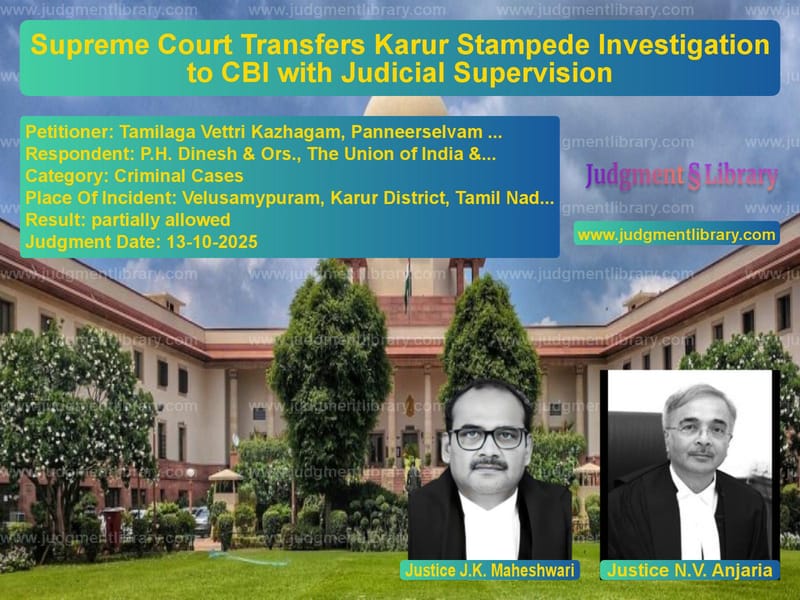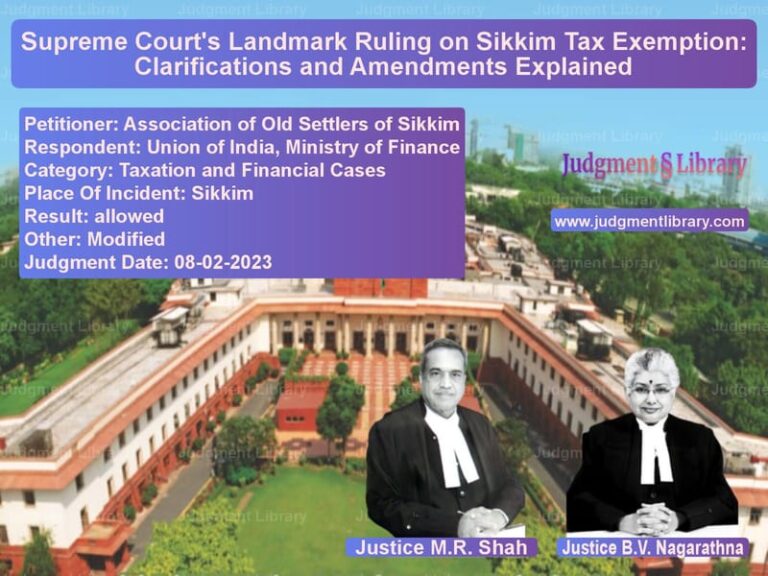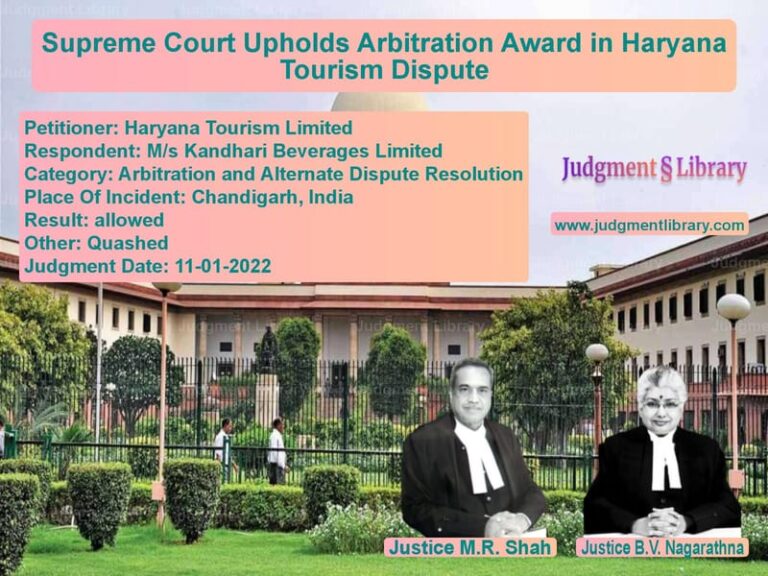Supreme Court Transfers Karur Stampede Investigation to CBI with Judicial Supervision
In a landmark interim order dated October 13, 2025, the Supreme Court of India addressed the tragic Karur stampede that occurred on September 27, 2025, in Velusamypuram, Karur District, Tamil Nadu. The incident, which claimed 41 lives and injured over 100 people during a political rally organized by the Tamilaga Vettri Kazhagam (TVK) party, led to multiple legal petitions seeking independent investigation and comprehensive safety protocols for public gatherings. The Supreme Court’s ruling represents a significant intervention in ensuring justice for the victims and accountability in the handling of mass public events.
The Tragic Incident and Initial Legal Proceedings
The Karur stampede occurred during a political rally headed by popular Tamil actor Vijay. The TVK had obtained permission from local police authorities on September 26, 2025, for the event. As huge crowds gathered to see the political leader, a catastrophic stampede ensued, resulting in massive casualties and injuries. Following the tragedy, FIR No. 855/2025 was registered at Karur Town Police Station under various sections of the Bhartiya Nayaya Sanhita, 2023, and the Tamil Nadu Public Property (Prevention of Damage and Loss) Act, 1992. The Chief Minister of Tamil Nadu immediately announced a one-member Enquiry Commission headed by retired High Court Judge Justice Aruna Jagadeeshan to investigate the incident.
Multiple Petitions and Conflicting High Court Orders
The legal landscape became complicated as multiple petitions were filed across different benches of the Madras High Court. Before the Madurai Bench, which had territorial jurisdiction over Karur, several writ petitions were filed seeking diverse reliefs. Some petitioners prayed “to direct the 3 and 4 respondents to order the 8 respondent to conduct Central Bureau of Investigation (CBI) enquiry to find the truth behind at least 39 people died in a stampede at a Tamil Nadu Karur District Tamilaga Vettri Kazhaqam (TVK) party rally.” Other petitions sought compensation for victims and families, with some specifically requesting “Rs.50,00,000/- (Rupees Fifty Lakhs) as compensation” for the families of the deceased and “Rs. 10 lakh compensation to those injured in the stampede.” Additional petitions focused on systemic reforms, seeking “to issue a Writ of Mandamus, directing the 1st respondent to draft and implement necessary and appropriate safety protocols and Standard Operating Procedures for all public gatherings, rallies and meetings to be conducted by any political party or such other organisation.”
Meanwhile, at the Principal Bench in Chennai, a separate petition (WP Crl No. 884/2025) filed by TVK before the incident was pending, seeking directions to police officials to grant permissions for political campaigns across Tamil Nadu. Surprisingly, the Single Judge hearing this petition expanded its scope to include guidelines for security deposits from political parties organizing public events. After the stampede, another petition (WP Crl No. 1000/2025) was filed before the same bench seeking formulation of Standard Operating Procedures (SOPs) for roadshows.
The judicial confusion intensified when the Division Bench at Madurai dismissed petitions seeking CBI investigation, noting that the police investigation was at a nascent stage and showing no flaws. Contradictorily, the Single Judge at Chennai, without referring any documents or assigning any reasons recorded dissatisfaction with the progress and independence of the investigation and directed the formation of a Special Investigation Team (SIT). This created a peculiar situation where two different benches of the same High Court reached opposite conclusions about the same investigation.
Supreme Court’s Critical Observations
The Supreme Court expressed serious concern over the handling of these cases by the Madras High Court. The bench noted that “learned Single Judge of the Main Seat of the Madras High Court entertained the writ petition for the prayers which were not made in the writ petitions, and expanded the scope without any foundation in pleadings.” The Court questioned how a writ petition concerning the Karur stampede, which fell within the jurisdiction of the Madurai Bench, was entertained by the Principal Bench in Chennai without orders from the Chief Justice. The judges also raised concerns about the Single Judge creating an SIT without joining necessary parties or providing them an opportunity to be heard.
Regarding the conflicting orders between the Division Bench and Single Judge, the Supreme Court observed that “such recourse prima facie indicates the lack of sensitivity and propriety to deal with such a matter creating multiplicity of proceedings, for the reasons best known to the Hon’ble Judges.” The Court also noted that the dismissal of petitions seeking SOP formulation by the Division Bench merely because a similar matter was pending before the Single Bench was not appropriate, especially when the pending petition wasn’t originally a Public Interest Litigation and lacked foundational pleadings for such relief.
The Supreme Court’s Interim Directions
After considering the gravity of the incident and the legal confusion, the Supreme Court invoked its extraordinary powers to transfer the investigation to the CBI. The Court relied on the precedent set in State of W.B. vs. Committee for Protection of Democratic Rights, where it was established that “this extraordinary power must be exercised sparingly, cautiously and in exceptional situations where it becomes necessary to provide credibility and instil confidence in investigations or where the incident may have national and international ramifications or where such an order may be necessary for doing complete justice and enforcing the fundamental rights.”
The Court found that the Karur stampede, having resulted in 41 deaths and over 100 injuries, had indeed shaken the national conscience and required exceptional measures. The bench noted that “the comments which have been made before the media by the top officers of the Police Department, may create doubt in the minds of the citizenry on impartiality and fair investigation” and emphasized that “the faith and trust of the general public on the process of investigation must be restored in the criminal justice system.”
In its interim order, the Supreme Court issued several crucial directions. It transferred the investigation of FIR No. 855/2025 to the CBI and suspended the operations of both the SIT constituted by the Single Judge and the Enquiry Commission formed by the Chief Minister. Most significantly, the Court constituted a three-member Supervisory Committee headed by former Supreme Court Justice Ajay Rastogi, who would choose two senior IPS officers not below the rank of Inspector General from outside Tamil Nadu. This Committee would monitor the CBI investigation, review collected evidence, and ensure the investigation reaches its logical conclusion.
The Court also directed that the pending petition regarding formulation of SOPs for political rallies (WP Crl No. 884/2025) be assigned to a Division Bench of the Madras High Court for proper adjudication. The State of Tamil Nadu was directed to bear all expenses of the Supervisory Committee and provide full cooperation to the CBI investigation.
Broader Implications and the Path Forward
The Supreme Court’s intervention in the Karur stampede case represents a significant moment in India’s judicial oversight of disaster management and political accountability. By transferring the investigation to the CBI under judicial supervision, the Court has addressed the core concerns about impartiality and independence in the investigation process. The creation of a Supervisory Committee headed by a retired Supreme Court judge sets a precedent for ensuring transparency in high-stakes investigations involving political elements and mass casualties.
The Court’s criticism of the Madras High Court’s handling of the matter serves as a reminder about judicial propriety, the importance of jurisdictional boundaries, and the need for coherence in judicial responses to public tragedies. The direction to expedite the formulation of comprehensive safety protocols for public gatherings acknowledges the systemic failures that often lead to such tragedies and emphasizes the state’s responsibility to prevent them.
As the CBI begins its investigation under the watchful eyes of the Supervisory Committee, the families of the 41 victims and the over 100 injured persons await justice. The Supreme Court’s interim order represents a crucial step toward ensuring that the tragedy leads not only to accountability for specific failures but also to systemic reforms that prevent such incidents in the future. The Court’s recognition that “fair investigation is the right of a citizen” underscores the fundamental principle that in the pursuit of justice, the process must be as important as the outcome.
Petitioner Name: Tamilaga Vettri Kazhagam, Panneerselvam Pitchaimuthu, S Prabakaran, Selvaraj P, G S Mani.Respondent Name: P.H. Dinesh & Ors., The Union of India & Ors., The State of Tamil Nadu & Ors., Government of Tamil Nadu and Ors..Judgment By: Justice J.K. Maheshwari, Justice N.V. Anjaria.Place Of Incident: Velusamypuram, Karur District, Tamil Nadu.Judgment Date: 13-10-2025.Result: partially allowed.
Don’t miss out on the full details! Download the complete judgment in PDF format below and gain valuable insights instantly!
Download Judgment: tamilaga-vettri-kazh-vs-p.h.-dinesh-&-ors.,-supreme-court-of-india-judgment-dated-13-10-2025.pdf
Directly Download Judgment: Directly download this Judgment
See all petitions in Custodial Deaths and Police Misconduct
See all petitions in Public Interest Litigation
See all petitions in Negligence Claims
See all petitions in Compensation Disputes
See all petitions in Judgment by J.K. Maheshwari
See all petitions in Judgment by N.V. Anjaria
See all petitions in partially allowed
See all petitions in supreme court of India judgments October 2025
See all petitions in 2025 judgments
See all posts in Criminal Cases Category
See all allowed petitions in Criminal Cases Category
See all Dismissed petitions in Criminal Cases Category
See all partially allowed petitions in Criminal Cases Category







